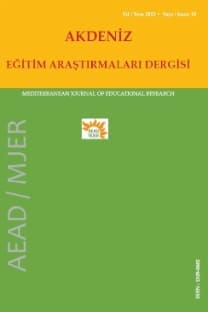'Türkiye'de İngilizce Öğretmeni Olmak' Üzerine Bazı Değerlendirmeler ve Öneriler
:İngilizce bugün tüm dünyada ortak iletişim dilidir ve dünyanın her yerinde olduğu gibi Türkiye’de de en popüler yabancı dildir. Dolayısıyla, Türkiye’de İngilizcenin öğretimine ve öğrenimine büyük bir çaba harcanmaktadır. Yıllar içinde daha iyi bir İngilizce eğitimi için bazı sistem ve müfredat değişiklikleri yapılmıştır. Ancak bu değişikliklerin başarı şansı sahadaki uygulayıcı olan İngilizce öğretmenlerine bağlıdır. Bu çalışma kapsamında, öncelikle İngilizcenin Türkiye’deki statüsü ve mevcut İngilizce öğretmenlerinin profilleri üzerinde durulacaktır. Sonrasında ise, mevcut ve gelecek İngilizce öğretmenleri için öğretmenlik üst kimliğini öncelemek, öğrencilere saygı duymak, branş farkındalığına sahip olmak, konformizmi terk etmek, öğrenen özerkliğine değer vermek, mesleki gelişimi sürdürülebilir kılmak ve kuramı hakkıyla uygulamaya dökmek başlıkları altında bazı katkı sağlayıcı önerilerde bulunulacaktır.
Some Thoughts and Suggestions on ‘Being an English Language Teacher in Turkey’
English is the common language of communication in the world today and it is the most popular foreign language in Turkey as it is anywhere in the world. Thus, a major effort is spent to the teaching and learning of English in Turkey. Over the years, some system and curriculum changes have been made for a better English education. However, the success of these changes depends on the English teachers who are the practitioners in the field. In this study, we will primarily focus on the status English in Turkey and the profiles of the current English language teachers. Then, some suggestions will be introduced for current and future English language teachers under the headings of adopting teaching profession as an upper identity, respecting students, developing branch awareness, abandoning conformism, giving value to learner autonomy, making professional development sustainable and putting theory into practice properly.
___
- Alagözlü, N. (2017). Türkiye ‘de İngilizce öğretmeni yetiştirme sorunları. Türkbilig, 34, 241-247.
- Altan, M. Z. (2006). Preparation of foreign language teachers in Turkey: A challenge for the 21st century. Dil dergisi, 134(1), 49-54.
- Altan, M. Z. (2016). Öğretmenliğe dair: Filmler ve öğretmenler. Ankara: Pegem Akademi.
- Arıkan, A. (2017). English language teachers’ views on the new national curriculum for 2nd graders, Journal of narrative and language studies, 5(9), 34-40.
- British Council ve TEPAV (2014). Türkiye’deki devlet okullarında İngilizce dilinin öğretimine ilişkin ulusal ihtiyaç analizi. Ankara: Yorum Yayın.
- Cullen, R. (1998). Teacher talk and the classroom context. ELT journal, 52(3), 179-187.
- Demirpolat, B. C. (2015). Türkiye’nin yabancı dil öğretimiyle imtihanı: Sorunlar ve çözüm önerileri. SETA.
- English First (2018). English proficiency index. https://www.ef.com.tr/epi/regions/europe/turkey/ Erişim Tarihi: 12.12.2018
- Gürsoy, E., Korkmaz, S. Ç., & Damar, A. E. (2013). Foreign language teaching within 4+ 4+ 4 education system in Turkey: Language teachers’ voice. Egitim arastirmalari-Eurasian journal of educational research, 53, 59-74.
- Kachru, B. B. (1985). Standards, codification and sociolinguistic realism: The English language in the outer circle. R. Quirk & H. Widdowson (Haz.), English in the world: Teaching and learning the language and literatures (s. 11–36). Cambridge: Cambridge University Press.
- Kırkgöz, Y. (2007). English language teaching in Turkey: Policy changes and their implementations. RELC journal, 38(2), 216-228.
- Kulavuz-Onal, D. & Tatar, S. (2017). Teacher burnout and participation in professional learning activities: Perspectives from university English language instructors in Turkey. Journal of language and linguistic studies, 13(1), 283-303.
- MEB (2017a). Öğretmenlik mesleği genel yeterlikleri. Ankara. http://oygm.meb.gov.tr/meb_iys_dosyalar/2018_06/29111119_TeachersGeneralCompet encies.pdf Erişim Tarihi: 10.09.2018
- MEB (2017b). Öğretmen strateji belgesi (2017-2023). Ankara. http://oygm.meb.gov.tr/meb_iys_dosyalar/2017_06/09140719_Strateji_Belgesi_Resmi_ Gazete_sonrasY_ilan.pdf Erişim Tarihi: 10.09.2018
- MEB. (2018). İngilizce dersi öğretim programı (ilkokul ve ortaokul 2, 3, 4, 5, 6, 7 ve 8. Sınıflar). Ankara: Talim ve Terbiye Kurulu Başkanlığı.
- Medgyes, P. (2001). “When the teacher is a non-native speaker”. M. Celce-Murcia (Haz.), Teaching English as a second or foreign language. New York: Newbury House, s. 429 442.
- Seferoglu, G. (2004). A study of alternative English teacher certification practices in Turkey. Journal of education for teaching, 30(2), 151-159.
- Taner, G. (2017). Investigating perceived competences of English language teachers in Turkey with regard to educational background and experience. Yayınlanmamış Doktora Tezi. ODTÜ, Sosyal Bilimler Enstitüsü.
- Walsh, S. (2002). Construction or obstruction: Teacher talk and learner involvement in the EFL classroom. Language teaching research, 6(1), 3-23.
- Yaman, İ. (2018). Türkiye’de İngilizce öğrenmek: Zorluklar ve fırsatlar. RumeliDE dil ve edebiyat araştırmaları dergisi, 11, 161-175.
- ISSN: 1309-0682
- Yayın Aralığı: Yılda 4 Sayı
- Başlangıç: 2008
- Yayıncı: Tayfun Taşbilek
Sayıdaki Diğer Makaleler
Okullarda Hayat Boyu Öğrenme Kültürü Ölçeği (OHBÖKÖ): Geçerlik ve Güvenilirlik Çalışması
SONER DOĞAN, Ayşe ÇALIŞKAN TOYOĞLU
NESLİHAN ÜLTAY, ESER ÜLTAY, SALİH KÜRŞAT ÇİLİNGİR
'Türkiye'de İngilizce Öğretmeni Olmak' Üzerine Bazı Değerlendirmeler ve Öneriler
Okul Öncesi Öğretmen Adaylarının Yansıtıcı Günlüklerin Değerlendirilmesine Yönelik Görüşleri
Nur AKCANCA, Lale CERRAH ÖZSEVGEÇ
Emergent Trends and Research Topics in Language Testing and Assessment
Ortaokul 5. Sınıf Öğrencilerinin Bağlam Temelli Öğrenme Uygulamaları Hakkındaki Görüşleri
Okulöncesi Dönem Çocuklarında Hayal Gücü ve Yaratıcılık İlişkisi
Sınıf Öğretmenlerinin Mesleki Kimliklerine Yönelik Görüşleri
